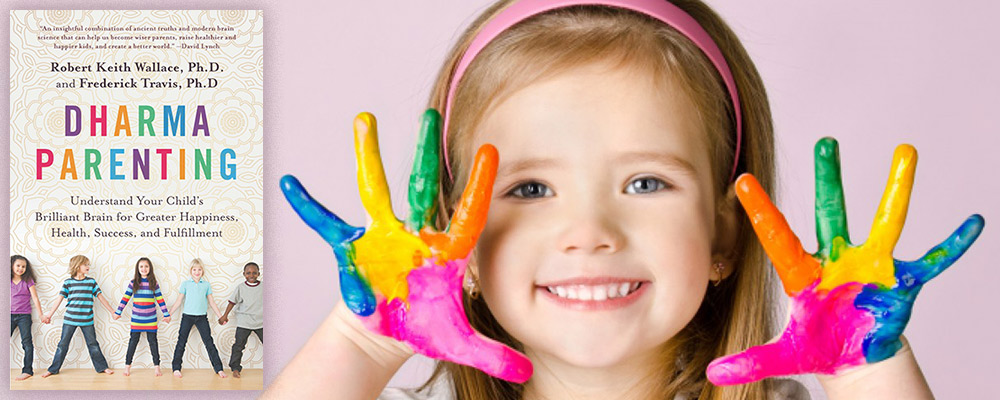Review of Dharma Parenting: Understand Your Child’s Brilliant Brain for Greater Happiness, Health, Success, and Fulfillment by Robert Keith Wallace, Ph.D. and Frederick Travis, Ph.D.
When I picked up Dharma Parenting and read the introduction, my first thought was: “I wish my parents had read this book!”
I actually had great parents and a happy childhood. But still, if they had been able to understand what the authors refer to as my “brain/body type,” as well as their own, it could have been even happier for everyone involved.
Back then, research on brain functioning was limited, and the knowledge of Ayurveda was mostly tucked away in India. Moms and dads in America had very little training on parenting, if any, and children did not arrive with an owner’s manual.
The book Dharma Parenting is a game changer. It’s a brilliant collaboration between two experts in human physiology and brain research, who are also deeply knowledgeable about Maharishi AyurVeda®, Maharishi Mahesh Yogi’s revival of India’s ancient system of natural healthcare.
The book presents three themes: Six Tools of Dharma Parenting, Three Styles of Brain Functioning, and Four Major Stages of Brain Development.
Living Our Dharma or Life Path
The word dharma comes from the Sanskrit verb dhri, which means to uphold or support. We each have our own dharma, or path in life. Our individual dharma is a blueprint for enjoying greater personal growth, happiness, and success. When we live in tune with our own dharma, we have more support from our surroundings, and less resistance to achieving our goals.
Maharishi referred to dharma as that which “supports all that is helpful for evolution and discourages all that is opposed to it. Dharma is that which promotes worldly prosperity and spiritual freedom.”
New Tools for More Enlightened Parenting
The authors present three life-changing themes in this book. The first theme presents their Six Tools of Dharma Parenting, a practical guide for understanding your child and their individual needs. Then they explain the Three Styles of Brain Functioning, which includes the Vata, Pitta, and Kapha styles, as defined by Ayurveda. Finally, they detail the Four Major Stages of Brain Development which take place between birth and the age of 25.
Let’s look at these three themes in greater detail.
 Six Tools of Dharma Parenting
Six Tools of Dharma Parenting
1. Discover Your Child’s, and Your Own, Brain/Body Type. Your brain/body type includes inherited tendencies and preferences that are hardwired from birth, your current state of balance or imbalance, and your constantly changing brain connections.
2. Heal Yourself. Even with all the demands of raising kids, you’ve still got to remain aware of your own needs—for your children’s sake as well as your own.
3. Attention and Appreciation. Childhood is a roller-coaster ride of growth and development, propelled by massive transformations in the child’s brain connections. Your attention is immensely important for your child to learn how to work in groups and develop self-esteem, social skills, a sense of right and wrong, respect for others, plus critical and creative thinking. By appreciating each new accomplishment of your child, you support their developing sense of self and ability to interact with the world.
4. Routines to Improve Family Dynamics. Establish routines—such as bedtime routines, mealtime routines, shopping routines, and structured family meetings—to give children a sense of security. Routines break up a long day into meaningful chunks, and give your child a feeling of being in control.
5. Manage Meltdowns and Cultivate Better Behavior. If things get out of hand, check in with yourself and with your child. Do what you can to comfort your child and change their brain state. Be prepared to make choices, consider possible consequences, and coach your child.
6. Anticipate and Adapt. Whether you’re focused on nurturing your child’s talents or working to ensure that family life moves smoothly through the day, part of your dharma as a parent is to anticipate your family’s needs. Look ahead to see how you can avoid crises. And when unexpected situations do come up, you’ll need to adapt to the situation, using your best judgment.
Three Styles of Brain Functioning
1. The Vata brain/body type is sensitive, always changing, and creative. This system processes information very quickly and also tends to switch attention very rapidly. The Vata brain can be inundated by outside stimuli, disallowing focused attention, which leads to the possibility of mistakes. The Vata type learns quickly, but can also become overwhelmed with too much information.
2. The Pitta brain/body type is dynamic, strong willed, and inquisitive. The brain’s executive system processes information at a moderate to high rate, while at the same time focusing on details. Even with this great ability to focus, the Pitta type at times is unable to inhibit strong emotional impulses, particularly anger.
3. The Kapha brain/body type is calm, steady, and kind. It processes information more slowly, but it is extremely reliable and accurate. Kaphas are slow learners, but at the same time their thinking is very methodical and steady. They are also the most emotionally stable type.
 Four Major Stages of Brain Development
Four Major Stages of Brain Development
1. From birth to age 3: This is a period of neural exuberance in which 24 million connections in the brain are made every minute. At the age of three, the cortex of the child is twice as thick as an adult’s.
2. Age 4 to 9: The high level of connections between your child’s brain allows them to quickly learn language, rules, and how to work in groups.
3. Age 10 to 17: What is called “synaptic pruning” begins. A child will lose 1-2% of their brain connections each year. At this point, the teen has developed nearly every brain area they need to see and respond to the world, with the exception of the frontal areas of the brain which help us foresee consequences.
4. Age 18 to 25: The synaptic connections become stable, and frontal connections almost finish their development. This time is called “emergent adulthood.”
This book can change the lives of parents by giving them deeper insights into the behavior and nature of each child—their innate tendencies, strengths and weaknesses, and how to best support their personal growth.
One More Essential Tool
The authors refer to the Transcendental Meditation® (TM) technique as the “ultimate tool” for successful parenting. The benefits of TM for parents include clearer thinking, relief from stress, and more energy. Regular meditation will also make it easier to implement all the other parenting tools explained above. And your job as a parent will be even easier once your children learn and practice TM as well.
A Deeper Understanding
I am convinced that this book will change lives. It can change the life of a parent by giving them deeper insights into the behavior and nature of each child—their innate tendencies, strengths and weaknesses, and how to best support their personal growth.
It can change the life of a child by allowing them to be at their best as often as possible, helping them to take a break when life becomes difficult, and encouraging them to pursue their own life purpose or dharma.
And it could change your life by allowing you to understand more deeply your own brain/body state, as well as that of your parents, and to gain a broader perspective on the relationship between you and your parents as you were growing up.
The Ultimate Gift
As the authors say in their Introduction: “The ultimate gift that anyone can give their children is self-knowledge and self-awareness, which allows them to build their own happiness and success. This doesn’t happen overnight, and requires both time and attention. As parents, we are not the architects of our children’s brain. We do, however, influence brain development through the environment we create for our kids, and the mental challenges and emotional support we provide for them.”
If you have children, I highly recommend that you read this book and put it to good use. If you have friends who are raising kids or plan to start a family, it would be a kind-hearted gift to send them a copy. Changing the life of even one child is the ultimate gift, and will change our world for the better.
Watch Dr. Wallace and Dr. Travis on Dharma Parenting ►
Order Dharma Parenting from the Enjoy TM Bookstore ►
 Robert Keith Wallace, Ph.D.
Robert Keith Wallace, Ph.D.
Dr. Robert Keith Wallace is a pioneering researcher on the physiology of consciousness whose early research on the TM technique opened the door to the scientific study of the mind/body connection and its application in behavioral medicine. His findings describing a fourth state of consciousness—beyond waking, dreaming, and sleeping—supported a new paradigm of health and human development.
 Frederick Travis, Ph.D.
Frederick Travis, Ph.D.
Dr. Fred Travis is a world-renowned neuroscientist who conducted groundbreaking research on the study of consciousness, the mind-body connection, and child development. He has investigated the relationship between brain patterns, conscious processes, and states of consciousness throughout all stages of development of the brain, from children to adults.


Comments
You May Also Like
Books
Readers of The Supreme Awakening Ask for More!
Fast on the heels of his highly successful first edition, Maharishi University of Management Vice-President Dr. Craig Pearson has released an expanded second edition.
Personal Growth
A Surge Protector against Stress
Norman Rosenthal, M.D., is a clinical professor of psychiatry at Georgetown Medical School, was the first psychiatrist to describe and diagnose Seasonal Affective Disorder, and was formerly Senior Researcher at the NIH. Enjoy his interview.
Maharishi
Conversations with Maharishi, Volume 2 Released
Join Dr. Vernon Katz as he sits by Maharishi’s side, and listen in on their exhilarating conversations about the highest potential of human life.